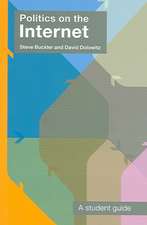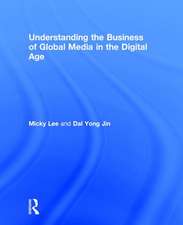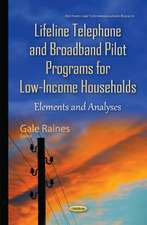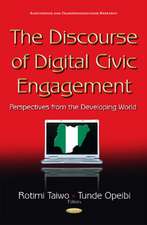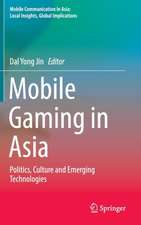De-Convergence of Global Media Industries: Routledge Research in Cultural and Media Studies
Autor Dal Yong Jinen Limba Engleză Paperback – 23 iun 2015
As the first comprehensive attempt to analyze the wave of de-convergence of the global media system in the context of globalization, this book makes sense of those transitions by looking at global trends and how global media firms have changed and developed their business paradigm from convergence to de-convergence. Jin traces the complex relationship between media industries, culture, and globalization by exploring it in a transitional yet contextually grounded framework, employing a political economic analysis integrating empirical data analysis.
| Toate formatele și edițiile | Preț | Express |
|---|---|---|
| Paperback (1) | 381.17 lei 6-8 săpt. | |
| Taylor & Francis – 23 iun 2015 | 381.17 lei 6-8 săpt. | |
| Hardback (1) | 1107.94 lei 6-8 săpt. | |
| Taylor & Francis – 26 feb 2013 | 1107.94 lei 6-8 săpt. |
Din seria Routledge Research in Cultural and Media Studies
- 18%
 Preț: 701.95 lei
Preț: 701.95 lei -
 Preț: 311.81 lei
Preț: 311.81 lei -
 Preț: 311.61 lei
Preț: 311.61 lei -
 Preț: 309.50 lei
Preț: 309.50 lei -
 Preț: 364.71 lei
Preț: 364.71 lei -
 Preț: 325.59 lei
Preț: 325.59 lei -
 Preț: 310.85 lei
Preț: 310.85 lei -
 Preț: 310.99 lei
Preț: 310.99 lei -
 Preț: 272.01 lei
Preț: 272.01 lei -
 Preț: 318.07 lei
Preț: 318.07 lei - 9%
 Preț: 1005.52 lei
Preț: 1005.52 lei - 9%
 Preț: 934.94 lei
Preț: 934.94 lei -
 Preț: 389.85 lei
Preț: 389.85 lei -
 Preț: 334.02 lei
Preț: 334.02 lei - 8%
 Preț: 382.97 lei
Preț: 382.97 lei -
 Preț: 301.58 lei
Preț: 301.58 lei -
 Preț: 309.27 lei
Preț: 309.27 lei -
 Preț: 362.42 lei
Preț: 362.42 lei -
 Preț: 311.41 lei
Preț: 311.41 lei -
 Preț: 327.02 lei
Preț: 327.02 lei -
 Preț: 309.31 lei
Preț: 309.31 lei -
 Preț: 420.36 lei
Preț: 420.36 lei -
 Preț: 485.07 lei
Preț: 485.07 lei - 18%
 Preț: 1231.89 lei
Preț: 1231.89 lei -
 Preț: 418.56 lei
Preț: 418.56 lei - 18%
 Preț: 1222.85 lei
Preț: 1222.85 lei - 18%
 Preț: 1055.51 lei
Preț: 1055.51 lei -
 Preț: 441.96 lei
Preț: 441.96 lei - 18%
 Preț: 1061.57 lei
Preț: 1061.57 lei - 18%
 Preț: 1116.38 lei
Preț: 1116.38 lei - 18%
 Preț: 1061.22 lei
Preț: 1061.22 lei - 18%
 Preț: 1051.72 lei
Preț: 1051.72 lei - 18%
 Preț: 1056.14 lei
Preț: 1056.14 lei - 18%
 Preț: 1054.97 lei
Preț: 1054.97 lei - 18%
 Preț: 1107.94 lei
Preț: 1107.94 lei - 18%
 Preț: 1056.63 lei
Preț: 1056.63 lei - 18%
 Preț: 1066.79 lei
Preț: 1066.79 lei - 18%
 Preț: 1117.77 lei
Preț: 1117.77 lei - 18%
 Preț: 1281.24 lei
Preț: 1281.24 lei - 18%
 Preț: 1005.01 lei
Preț: 1005.01 lei - 18%
 Preț: 737.98 lei
Preț: 737.98 lei
Preț: 381.17 lei
Nou
Puncte Express: 572
Preț estimativ în valută:
72.93€ • 76.36$ • 60.35£
72.93€ • 76.36$ • 60.35£
Carte tipărită la comandă
Livrare economică 05-19 aprilie
Preluare comenzi: 021 569.72.76
Specificații
ISBN-13: 9781138922167
ISBN-10: 1138922161
Pagini: 186
Ilustrații: 12 black & white tables, 12 black & white line drawings
Dimensiuni: 152 x 229 mm
Greutate: 0.26 kg
Ediția:1
Editura: Taylor & Francis
Colecția Routledge
Seria Routledge Research in Cultural and Media Studies
Locul publicării:Oxford, United Kingdom
ISBN-10: 1138922161
Pagini: 186
Ilustrații: 12 black & white tables, 12 black & white line drawings
Dimensiuni: 152 x 229 mm
Greutate: 0.26 kg
Ediția:1
Editura: Taylor & Francis
Colecția Routledge
Seria Routledge Research in Cultural and Media Studies
Locul publicării:Oxford, United Kingdom
Public țintă
Postgraduate and UndergraduateCuprins
1. Introduction Part 1: Convergence of the Global Media Industry 2. Media Convergence of the Global Media Industry 3. Transformation of the Broadcasting Industry 4. Transnationalizaiton of the Advertising Industry 5. Convergence of the Movie Industries Part 2: De-convergence of the Global Information Systems and Culture 6. Restructuring of the Global Telecommunications System 7. De-convergence of the information and Software Industries 8. De-converging Convergence in the Global Communication Industries 9. Convergence vs. De-convergence in News and Journalism 10. Conclusion
Notă biografică
Dal Yong Jin is Associate Professor in the School of Communication at Simon Fraser University, Canada.
Recenzii
"Dal Yong Jin’s De-Convergence provides an invaluable survey of the changing political economic landscape of the communication sectors in the 21st century. Its theoretically informed and empirically-rich analysis make it an essential text for anyone interested in the unstable and contradictory processes of corporate restructuring in the wake of three decades of ‘convergence’ and ‘ synergy’ in the fields of media, telecommunications, and ICT." Scott Fitzgerald, Curtin Graduate School of Business, Australia
"This book provides a well-grounded and timely account of changes and continuities in the structures of the global communications sector. It provides many new insights on the wave of ‘de-convergence’, and its political, economic, technological, and cultural dimensions." Paschal Preston, Dublin City University, Ireland
"This book provides a well-grounded and timely account of changes and continuities in the structures of the global communications sector. It provides many new insights on the wave of ‘de-convergence’, and its political, economic, technological, and cultural dimensions." Paschal Preston, Dublin City University, Ireland
Descriere
As the first comprehensive attempt to analyze the wave of de-convergence of the global media system in the context of globalization, this book makes sense of those transitions by looking at global trends and how global media firms have changed and developed their business paradigm from convergence to de-convergence. Jin traces the complex relationship between media industries, culture, and globalization by exploring it in a transitional yet contextually grounded framework, employing a political economic analysis integrating empirical data analysis.

